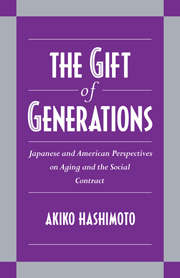Book contents
- Frontmatter
- Contents
- List of Tables and Figure
- Preface
- Acknowledgments
- 1 The Social Designation of Deserving Citizens
- 2 Two Communities, Two Societies
- 3 Rights and Responsibilities in the Public Domain
- 4 The Practice of Protection and Intervention in the Private Domain
- 5 The Japanese Viewpoint
- 6 The American Viewpoint
- 7 Cultural Assumptions and Values
- 8 The Social Regulation of Interests
- 9 Conclusion
- Appendix: Methods of Research
- Bibliography
- Index
8 - The Social Regulation of Interests
Published online by Cambridge University Press: 03 February 2010
- Frontmatter
- Contents
- List of Tables and Figure
- Preface
- Acknowledgments
- 1 The Social Designation of Deserving Citizens
- 2 Two Communities, Two Societies
- 3 Rights and Responsibilities in the Public Domain
- 4 The Practice of Protection and Intervention in the Private Domain
- 5 The Japanese Viewpoint
- 6 The American Viewpoint
- 7 Cultural Assumptions and Values
- 8 The Social Regulation of Interests
- 9 Conclusion
- Appendix: Methods of Research
- Bibliography
- Index
Summary
The support relationship is inherently unequal, because it evolves out of the interaction between givers and receivers. Support is asymmetrical at each moment in time, since every act of giving is essentially a one-sided endeavor, where help that emanates from one person is obtained by another. Every meal that Ernest's daughter prepares for him and every stipend that Teru's son gives to her are gifts that define the positions of the giver and the receiver respectively. The support relationship entails the seed of inequity between those who are in a position to give and those who are not, because it relies on the intrinsic distinction of the material and instrumental resources that they own.
When these positions become fixed over time, the support relationship develops into one in which the giver and the receiver lose the critical sense of mutuality about the help that is given and received. Instead of taking turns with Ernest, his daughter always hosts the family dinners for him; likewise, Teru cannot reciprocate her son's financial help. Ernest and Teru have become regular receivers of support, with limited resources to return the favors and gifts they accept. When giving and receiving are regularized, the support relationship inevitably creates a pattern of inequity that is referred to also as dependency.
Given individual differences in material and instrumental resources, some are bound to be in the stronger position to give, and others less so.
- Type
- Chapter
- Information
- The Gift of GenerationsJapanese and American Perspectives on Aging and the Social Contract, pp. 163 - 181Publisher: Cambridge University PressPrint publication year: 1996



